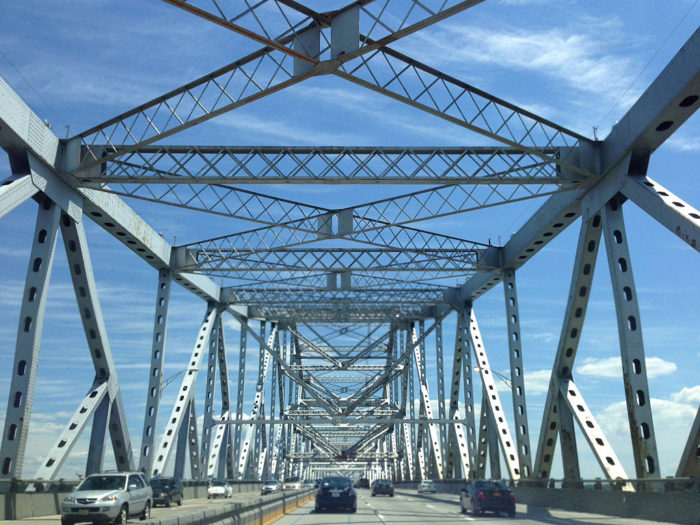This article first appeared in the Opinion section of the New York Times. View original.
Written by Dr. Leonard S. Schleifer
 Just a few miles from my office sits the Mario Cuomo Bridge, crossing a critical expanse of the Hudson River. The new bridge, which required a $4 billion investment, is a major improvement over the previous Tappan Zee and a safer, more pleasant journey for motorists. And it’s a boon for high-growth regional companies like mine: It supports the efficient movement of supplies and finished products, makes for a happier commute for our employees and can make a difference in recruiting key talent.
Just a few miles from my office sits the Mario Cuomo Bridge, crossing a critical expanse of the Hudson River. The new bridge, which required a $4 billion investment, is a major improvement over the previous Tappan Zee and a safer, more pleasant journey for motorists. And it’s a boon for high-growth regional companies like mine: It supports the efficient movement of supplies and finished products, makes for a happier commute for our employees and can make a difference in recruiting key talent.
Despite this project and other long-overdue investments, such as the La Guardia Airport renovation, New York is still in dire need of repair. A recent study found that one third of New York’s major highways are in poor or fair condition, and that over the next 20 years, the state will need to spend $36 billion to upgrade and maintain our wastewater system.
Nationwide, we have an infrastructure investment gap over the next two decades of approximately $5 trillion, according to the American Society for Civil Engineers. This is a significant public health issue. Nearly 21 million Americans live in areas where community water systems fail to meet quality water standards, and some roadways are an imminent public safety hazard. It’s a serious economic handicap, too. American companies could lose $340 billion in sales through 2023because of poor infrastructure, according to the American Public Transportation Association.
President Trump and members of Congress from both parties have raised the alarm. Lawmakers have floated the idea of an “infrastructure bank” to support investments. Despite widespread public support, the major stumbling block has been how to fund such an effort. Increasing personal or corporate income taxes or imposing “wealth taxes” on individuals has no chance of securing bipartisan support.
With so much at stake, it is time to consider a novel source of funding: Public corporations should step up and lead the way.
The solution is simple: Tap into businesses that stand to benefit from infrastructure improvements — and by extension their wealthy investors. I suggest that for each of the next three years, every American public company be required to issue 1 percent of its equity in the form of new stock to a newly formed infrastructure “bank.” Given that American public companies have a collective market capitalization of about $30 trillion, this would raise about $1 trillion in three years.
The corporate stock contributions would be based on the number of shares a company has outstanding, not whether it makes a profit. The $1 trillion in stock would form the capital of an infrastructure bank, which could in turn provide grants or loans to support worthy infrastructure projects. Although detailed mechanisms for issuing the stock and managing the portfolio would need to be defined, this plan should be more straightforward than an income tax.
Various models for an infrastructure bank already exist. It could operate much like a bank, making loans that must be repaid with interest, or it could be something like a university endowment or a foundation that might even liquidate itself once its infrastructure mission is accomplished. Whatever the operating model, it should be apolitical, so a bipartisan group of experts should oversee the disbursement of funds.
Although some companies and their shareholders will surely grumble, this would hardly be a burden, given that 1 percent represents a typical daily fluctuation in many companies’ stock prices. And last year American public companies shelled out about $800 billion just to buy back their own stock. That might turn out to be a good investment for some companies, but investing in infrastructure is a sure win. The White House Council of Economic Advisers estimates that gross domestic product would increase up to $13 billion a year for every $100 billion in infrastructure investment.
This small equity dilution of companies takes the financial responsibility for infrastructure off the backs of most American taxpayers. Instead, it would put the burden onto wealthy Americans and foreigners. Today, 84 percent of all stock held by Americans belongs to the wealthiest 10 percent of households, and foreign investors account for 35 percent of investment in American stocks.
But the benefits of infrastructure improvements would cascade to all Americans, and hundreds of thousands of jobs could be created by large-scale infrastructure projects. Moreover, the benefit can help put money back in the pockets of many Americans. Poor infrastructure costs the average American family an estimated $3,400 a year because of higher gasoline consumption, increased wear and tear on vehicles, and costs related to power outages.
Of course, the federal government should make infrastructure investing a priority. But corporations must also do their part. I look forward to the day when most Americans can point with pride to the new bridges, roadways, water systems and trains in their neighborhoods, which will ensure that our country remains a leader in innovation and economic growth.
…
Leonard S. Schleifer is the chief executive of Regeneron Pharmaceuticals and a former chairman of New York’s Mid-Hudson Regional Economic Development Council.
Tags: Corporate Investment, Leonard S. Schleifer, New York Times






 RSS Feed
RSS Feed